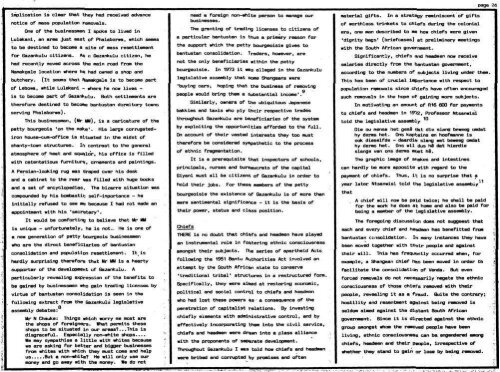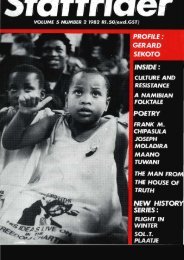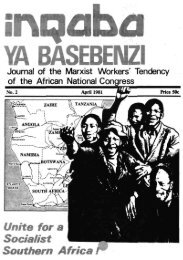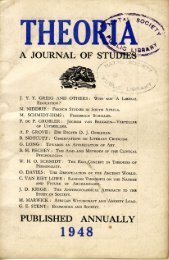Create successful ePaper yourself
Turn your PDF publications into a flip-book with our unique Google optimized e-Paper software.
Implication la clnr that they hod received advance<br />
notice of masa population removals,<br />
Oia of tha businessman I spoke to llvad in<br />
Lulekanl. an area Just east of Pholaboree, which seams<br />
to t>a destined to bacoaa) a alta of M U resettlement<br />
for Gezankulu citizens. A* a Gezankulu citizen, ha<br />
had recently moved acrose tha main road froa tha<br />
raamakoale location ahere ha had owned a tihop and<br />
butchery. (It seems that namafcgale la to become pert<br />
of Lebowa, ahlla Lulekanl - ahere Ha now Uvea -<br />
la to bacoaa part of GaxanKulu. Both settlements are<br />
therefore deatined to bacoaa bantuatan dormitory towns<br />
serving Phelaborea}.<br />
Thla businessmen, (Ur uV)t la a caricature of tha<br />
patty bourgeois 'on the make'. Hia large corrugated-*<br />
Iron housa-cum-office la situated In tha aidat of<br />
shanty-town structures. In contraat to tha general<br />
atmosphere of heat and squalor, hla office la filled<br />
alth ostentatious furniture, ornaaants and paintings.<br />
A Persian-looking rug aas draped over his desk<br />
and a cablnat to tha rear aas filled alth huge books<br />
and a sat of encyclopedias. Tha bizarre situetlon aaa<br />
compounded by hia boabastit self-importance - ha<br />
Initially rafusad to sea a* because I had not aade an<br />
appointment with his 'secretary'.<br />
It would be comforting to believe that Mr hmi<br />
la unique - unfortunately, ha la not.. He is one of<br />
e nee generation of petty bourgeois businessmen<br />
aho are the direct beneflciarlee of bantuatan<br />
consolidation and population resettlement. It is<br />
hardly surprising therefor* th*t ar HI Is i hearty<br />
supporter of the development of Gazankulu. A<br />
particularly revealing expression of the benefits to<br />
be gained by businessman aho gain trading licenses by<br />
virtue of bantuatan consolidation is seen In tha<br />
following extract from tha Gazankulu legislative<br />
assembly debates: 8<br />
Mr N Chauke: Things stildi aorry ma most era<br />
tha shops of foreigners, wnat permits these<br />
shops to be situated in our areas?...Thla Is<br />
disgraceful. Especially non-ehlte shops....<br />
me may sympethlee a little alth ehites because<br />
ee are asking for batter and bigger businesses<br />
from whites with which they muat come and help<br />
us But a non-white? He will only use our<br />
money and go aaay with tha money, we do not<br />
*<br />
need e foreign non—white parson to manage our<br />
businesses.<br />
The granting of trading licenses to citizena of<br />
a particular bantuatan is thus a primary reason for<br />
tha support which tha petty bourgeoisie gives to<br />
bantuatan consolidation. Traders, however, are<br />
not tha only beneficiaries within the petty<br />
bourgeoisie. In 1973 it waa alleged in the Gazankulu<br />
legislative assembly that soma Shengaans ware<br />
'buying cars, hoping that the business of removing<br />
paople would bring them a flubatantlal income*.<br />
Similarly, owners of tha ubiquitoua Japanese<br />
bakkles and taxla who ply ttair respective trades<br />
throughout Gazankulu are beneficiaries of the systaa<br />
by exploiting tha opportunltlea afforded to tha full-<br />
On account of their vested interests they too must<br />
therefore be conaiderad sympathetic to the process<br />
of ethnic rrmgmantetion.<br />
It is a prerequisite that inspectors of schools,<br />
principals, nurses end bureaucrats of tha capital<br />
Glyanl must all be citizens, of Gazankulu in order to<br />
hold their Jobs. For thes% members of tha petty<br />
bourgeoisie the existence of Gazankulu Is of mora than<br />
mere sentimental significance - it la the basis of<br />
their power, status and class position.<br />
Chiefs<br />
TnOTe la no doubt that chiefs mnd headman have played<br />
an instrumental role in fostering ethnic consciousness<br />
amongst their subjects. Tna series of apartheid Acts<br />
following tha 1951 Bantu Authorities Act involved an<br />
attempt by the South African state to conserve<br />
'traditional tribal' structures in a restructured form.<br />
Specifically, they ware almtd at restoring economic,<br />
political and social control to chiefs and headmen<br />
who Had lost these powere aa a consequence of the<br />
penetration of capitalist relatione. By Investing<br />
chiefly elements with administrative control, and by<br />
effectively incorporating them Into tha civil service,<br />
chiefs end headmen ware dr*en into a class alliance<br />
with tha proponents of separate development.<br />
Throughout Gezanfculu I aaa told hoe chiefs and heariann<br />
were bribed and corrupted by promises and often<br />
- -•'- 1 •* - A ' " * T * •<br />
material glfta. In a strategy raminiscant of gifts<br />
of worthless trinkwts to chlafs during the colonial<br />
era, one man described to ma how chiefs were given<br />
'dignity bags' (briefcases) at preliminary meetings<br />
with tha South African government.<br />
Significantly, chlafs and headmen now receive<br />
salariee directly from tha bantuatan government,<br />
page H<br />
according to the numbers of subjecta living under them.<br />
This has bean of crucial importance with respect to<br />
population removals since chiefs have often encouraged<br />
such ramovala in tha hope of gaining mora subjects.<br />
In motivating ^n amount of fl16 600 for payments<br />
to chiefs and haooaan In 19?2, Professor Ntsanwisi<br />
told the legislative assembly<br />
Oia ou manse hat gese tint die sLano baweag oadat<br />
hy dense hat. One kaptelna an hoof manna la<br />
ook diasalfde - dmartlla slang eat bmwewg omoat<br />
hy denes hat. 0ns all dus hi dat hlerdle<br />
slenge van ons dams w»t he.<br />
The graphic image of snakes and Intestines<br />
can hardly be mora apposite alth regard to tha<br />
payment of chiefs. Thus, It is no surprise that a<br />
year later Ntsanwisi told tha legislative assembly*<br />
that<br />
A chief will now be paid twice; ha shall be peld<br />
for the wot* ha does at home and also be paid for<br />
being a member of tha legislative assembly.<br />
Tha foregoing dlscuasion does not suggeest that<br />
each and ewry chief and headman has benefitted from<br />
bantuatan consolidation. In many Instances they have<br />
bean moved together with th*lr people and against<br />
their will. Thla has frequently occurred whan, for<br />
example, a Shengnen chief has bean moved In order tft f<br />
facilitate tha consolidation of Vanda. But even<br />
forced remove Is do not neceasarily negate the ethnic<br />
consciousness of those chiefs removed with their<br />
people, revealing it as a fraud. Quite tha contrary;<br />
hostility and resentment against being removed la<br />
seldom aimed against the distant South African<br />
government. Since it Is directed against tha ethnic<br />
group amongst whom the removed people have bean<br />
living, ethnic consciousness can be. engendered among<br />
chiefs, headman and their people, irrespective of<br />
whether they stand to gain or loam by being removed.

















